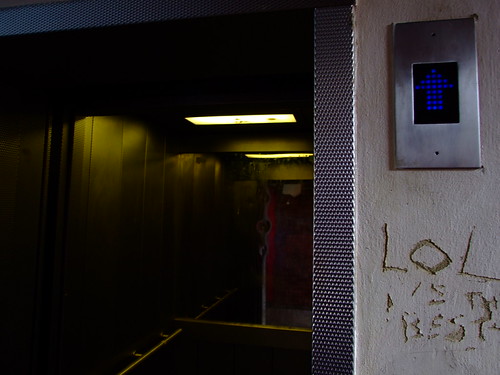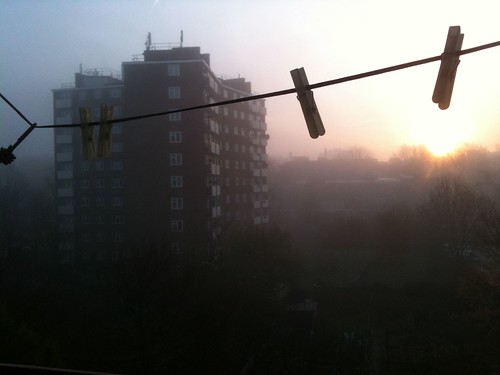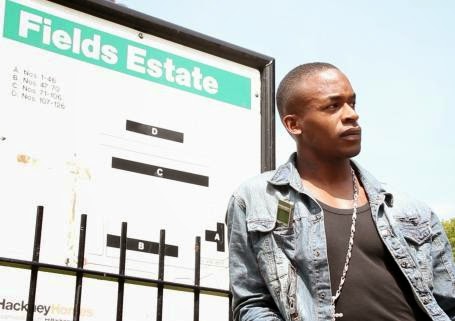
Earlier this year I posted the two Certified Connections pieces. This is the third and last of those. In the first I tried to disentangle the relationship between instrumental artists and the often buried ideas behind their music, using No Fixed Abode (LHF)’s “Certified” and its samples as a starting point for a meander into this history of music behind it.
In the second, No Fixed Abode took the source of some of the samples – Robin Travis – and explained the context around them; in other words the negative cycles of gang violence in inner city London that many of us are oblivious to but are in proximity to.
In this final post, I’d like to talk about Robin Travis’ autobiography “Prisoner to the Streets,” that centers around the long standing Tottenham/Hackney beef.

I’ve been trying, fairly ineffectually, to read “Thinking, Fast and Slow” for a while now. It’s really quite dense but because it fulfills on its promise to re-engineer how you think about how you think, I’m persisting. “Prisoner to the Streets” is in some ways similar, though in others it could not be more different.
If “Thinking…” is about how your head thinks, “Prisoner…” is a first person account of Travis’ life written as if actually inside his head. It is written in part in London street slang, so having heard some grime will help a reader. And grime is where the light comparison with the effect of “Thinking…” comes in, because while “Prisoner…” wont make you change how you think about you think, it will – unless you’re from the roads already – change the point of perspective from which you think. I’m a slow reader and my life is so digitally saturated (laptop, Apple TV, iPhone, 4G, wifi, Twitter, Facebook, the State app, BBC app, email email email…) that the times I do read are snatched during the day. Yet “Prisoner…” gripped me so strongly this Christmas I pushed all distractions aside. It’s one of those “I’ll just read oooone more page… whoops it’s 1:30am” kinda books.
If you care about grime, there may be several reasons why you do. Obviously since its inception, its appeal lies in that it is sonically shocking music and has an aggressive, masculine, flight-or-fight impact to the system. It’s also lyrically and musically abstract too, yet also quite human.
But a large secondary appeal for me and many others, is that it is the strong and unique voice of a broadly under-heard community, namely the unequal and often violent multicultural parts of east and south London. It’s margins music. To me at least, hearing and understanding things from another perspective – especially packaged up in such sonically interesting way – has always been something I want to be open to.

-- Tiverton Estate by Nico Hogg
Even with such earnest intentions however, it’s best to remember that no matter where it came from, much of grime is a very exciting blend of artistic license, creative fiction, projection and aspiration. If as many people were shot or shanked by MCs as they said they were going to be per track, Trident and half of the armed forces would have shut Bow down in a massive show of force. If every MC moved as many kilos of drugs as they talked about, they… wouldn’t be talking about it. If every MC was as confident as the perennial “I’m sick/you’re a prick” meme, they’d all be JME or Jamal Edwards. We accept all these contradictions, between grime-as-reportage and grime-as-fiction, because it’s just so sonically exciting, just like Hollywood blockbusters and the stunts that simply can not be if Newton and his laws are still right.
What most grime MCs aren’t good at is showing weakness or doubt, probably because they seem to be raised in hyper violent male dominated arenas where showing weakness is unthinkable. Arenas – either the ends itself or on radio – where the unit of currency is reputation and reputation brings protection and status.
So what’s truly remarkable about Robin Travis’ autobiography, is that to a grime fan, it re-arranges completely the point of perspective. It’s not grime as a window into another way of life, but another way of life that was pretty grimey. But with this shift from fiction to fact, we lose some or all of the over-positive projection. In my experience, even of talking to grime MCs – i.e. guys from these environments - face to face, this kind of account feels pretty unique.
Take this fragment:
“Mix up or no mix up, I can’t lie, I loved these cussing matches. Sometimes they were so funny, man would be dying of laughter. It didn’t matter who had street ratings, when these matches started anyone could be top dog. It was always funnier when a member of the crew, lower in the ranks, was able to upset one of the top dogs. Holly Street is the funniest area of all the areas I ever lived in. Which is why I liked to chill there so much, even though I wasn’t feeling certain man in the team.”What’s fun here is the common humanity revealed through humour. As you might have worked out, Robin is from the ends. He grew up poor, his Dad was absent when he was a kid (presumed dead) and his family suffered violence from the National Front. His early years were spent on the Tiverton Estate (co-incidentally where Keysound photographer Nico Hogg grew up).

While he didn’t become a drug dealer or contract killer, it’s fair to say Robin lived a very violent life; much of the book’s narrative follows his many inter- and intra-ends beefs and the complex street reputation logic as to why, how and when beef should happen. Fights happen in most chapters as Robin gets better and stronger when it’s on.
(Side note: throughout this whole piece its worth considering the idea that if you were one of his victims, you might reject his entire line of reasoning, for quite understandable reasons, a bit like how one nation’s victorious war hero is another’s mass murderer. It’s a great book, but I thought this regularly while reading it.)

Even in the backdrop of regular violence however, “Prisoner…” is not a book about violence, it’s a window into the entrenched street mentality. So when he says “it didn’t matter who had street ratings, when these matches started anyone could be top dog” or “Holly Street is the funniest area of all the areas I ever lived in. Which is why I liked to chill there so much, even though I wasn’t feeling certain man in the team” its clear how far this differs from the creative yet inflexible and humourless “I’m sick/you’re a prick” fictions of grime artists, and how every day elements like humour, love, hunger, surroundings, education, sport or family can be as much a focus as beef, violence, or road reputation.
When reading an account of a violent man in a violent environment, you naturally begin to ask the usual nature/nurture questions. And while I think it’s misguided to think there is any kind of “right answer” to that false dichotomy – in other words, that the answer is ‘both are a factor’ not ‘one or the other’ – one early entry stuck with me through the many vicious encounters in the book:
“I remember my first ever fight. I was five years old. I was playing football on the estate when one of the kids punched me. I walked upstairs to our flat on the first floor and went inside.
‘Why’s your face so push up?’ mum asked.
‘No reason. Malachi just hit me.’
‘And what did you do?’
‘Nothing, mum. You hit me all the time.’
Mum stood up. ‘Hear me good, I’m your mum,’ she said in a firm voice. ‘I gave birth to you. I didn’t do that so that other people can beat you. No go outside and don’t come back until you win that fight. I’ll be watching from the balcony.’
I was shocked. Mum’s giving me permission to fight. Rah!
I went back downstairs with butterflies in my stomach. I was scared to start with but compared to how my brother whupped me, I couldn’t see how this boy my age could cause me any real pain. In fact I wiped the floor with him.
I looked up. Mum seemed proud that I had defended myself. But I hated fighting. I would have preferred to let it slide without confrontation, but I knew if I didn’t go and give Malachi a good hiding I would have to face ‘johnny’ at home.
That day was a turning point… I went to school with a screwface most days and didn’t pay attention in class… Here is what [his teacher] Miss Leonard says:
‘I remember Robin well. A quiet, often sad boy. He rarely smiled and often came to school angry and frustrated about stuff that was happening at home. I encouraged him to take out his anger on a cushion or a teddy, like a punch bag. Robin was underachieving although he appeared bright and eloquent. He looked thin and frail at times and appeared vulnerable. ‘”
The fact that teachers are constantly dealing with the porous “boundary” that school hours impose is probably no surprise to anyone that’s spoken at length to a teacher. The fact that someone like Robin faced violence at home as much as he did outside it is also probably not news either. Home, school, road are all in flux or dialog with each other and more than likely several other agents or environments. The point here though is that through Robin you can see them all interacting. These interactions - or indeed intersections - only grow more vivid as Robin begins to articulate the different sides mental arguments he sees, as he faces more and more physical arguments.
So instead of just seeing the projected “I’m sick” half of the “I’m sick/you’re a prick” projection we see in grime, instead it’s a constant internal battle between “Do I want to be sick?/Do I want to be safe” (and I mean ‘safe’ in the grime parlance sense).
An example of Robin’s dichotomy:
VOICE OF THE STREETS: yeah just do it
VOICE OF REASON: No, don’t. You’re only going to get yourself life’d off in jail.
Or, in an other:
VOICE OF THE STREETS: Job? Are for real, bruv? You done tried this working ting a’ready. It’s not for you, G. You’re not keeping it real out here. You’re a black boy from the hood with no qualifications. You were fired from your last job. Do you think anyone’s gonna to take you on with that record? You’re a road man. Stick to the fuckin’ script.
VOICE OF REASON: Nah, bu’n that talk. Come better that that, my yute. Look a job. That’s the right ting. Your mum never raised no fool. And you know your Nan would want better for you.
VOICE OF THE STREETS: Bruv, Kane’s still walking around and you’re talking about getting a job. You’re acting like you’re not on this ting any more. In fact… nah, nah, get a job. At least that way when we kill Kane they won’t suspect us coz you earn an ‘honest’ living. Yeah, do that, bruv. That idea’s sick. Lol.
I’m reluctant to sketch out the main events of the book, as it’ll only ruin it for anyone who reads it, but it’s safe to say the story is gripping. Robin sees more drama in one chapter than most people see in their lives. It’s also safe to say it’s pretty amazing that he’s not imprisoned (“life’d”) or dead several times over.
But he isn’t and I for one am intensely grateful that he took the time to write down an account – for better or for worse – of life from his perspective. Because to solve a problem you need to first understand it, and far too many people speak about the actions on the outcomes of unequal societies without understanding the nature and causes of them.
- Buy "Prisoner to the Streets"
- Official "Prisoner to the Streets" site.